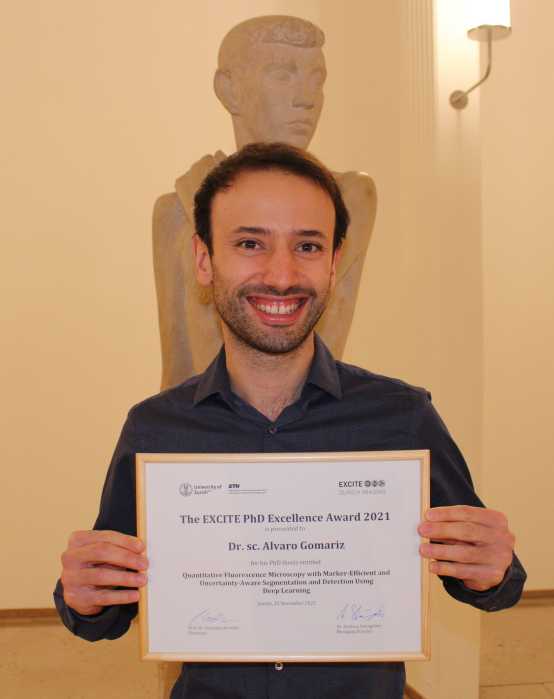Alvaro Gomariz wins the 2021 EXCITE PhD Excellence Award
Dr. Alvaro Gomariz of the Computer-assisted Applications in Medicine group at ETH Zurich receives this year's best PhD award from EXCITE Zurich
The Center for Experimental and Clinical Imaging Technologies Zurich (EXCITE Zurich) is a cross-sectional platform for biomedical imaging to facilitate the development of innovative, experimental and clinical imaging technologies. EXCITE Zurich advances basic and applied biomedical imaging research.

Dr. Alvaro Gomariz performed his thesis titled Quantitative Fluorescence Microscopy with Marker-Efficient and Uncertainty-Aware Segmentation and Detection Using Deep Learning at the Computer Vision Lab at ETH Zurich under the supervision of Prof. Dr. Orcun Göksel. The thesis proposes a deep learning based image analysis solutions for fluorescence microscopy images, in particular for the semantic segmentation of larger structures and the detection / localization of relatively smaller objects, e.g. cells. It contains several, very relevant, interesting, and novel contributions, with potential impact not only in fluorescence microscopy imaging, but also in other diverse imaging fields and applications. One of his major contributions is the development of a deep-learning method for imaging techniques with multiple modalities, where some of these modality images may be missing for some samples in training or application time; for example, for different markers in fluorescence microscopy or for different sequences in magnetic resonance imaging. Conventionally, such partially incomplete samples cannot be used in deep learning, hence typically available datasets cannot be utilized efficiently for multi-modality training and curating usable datasets become very cumbersome and costly. Alvaro’s solutions circumvent this limitation, opening new possibilities in several imaging fields. Another major contribution in his thesis was on incorporating deep learning uncertainties in object detection, e.g. cells in microscopy, for any analysis of their spatial distributions. Using 3D quantitative microscopy, he also meanwhile showed a major flaw in common flow cytometry that it may be missing out detecting majority of cells, at least in bone marrow. His research software, together with imaging and annotation datasets, is now publicly released, which bolsters a much wider impact of his work, while enabling easier translation to other imaging fields.
The thesis can be found here:
external page https://doi.org/10.3929/ethz-b-000479425
Information on the award available on eht EXCITE website:
https://excite.ethz.ch/research/PhDAward/2021.html